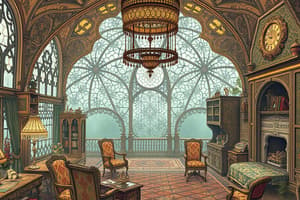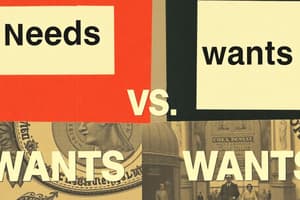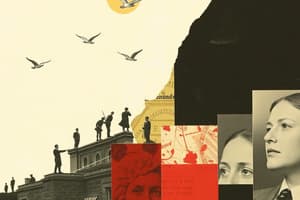Podcast
Questions and Answers
Match the economic term with its definition:
Match the economic term with its definition:
Scarcity = The condition that results from society not having enough resources to produce all the things people would like to have Factors of production = Resources required to produce things people would like to have; they include land, capital, labor, and entrepreneurs Consumer good = An item intended for final use by individuals Service = Work that is performed for someone; includes haircuts, home repairs, and forms of entertainment
Match the resource with its description:
Match the resource with its description:
Land = Natural resources not created by humans; 'gifts of nature' Capital = The tools, equipment, machinery, and factories used in the production of goods and services; does not include the entrepreneur Labor = People with all their efforts, abilities, and skills Entrepreneur = A risk-taker in search of profits who does something new with existing resources
Match the economic concept with its explanation:
Match the economic concept with its explanation:
Production = The process of creating goods and services Gross Domestic Product (GDP) = The dollar value of all final goods, services, and structures produced within a country's borders in a 12-month period Capital good = A manufactured item used to produce other goods and services Want = A way of expressing a need; something we would like to have but is not necessary for survival
Match the economic agent with its role:
Match the economic agent with its role:
Match the economic term with its function:
Match the economic term with its function:
Match the following economic concepts with their definitions:
Match the following economic concepts with their definitions:
Match the following market types with their descriptions:
Match the following market types with their descriptions:
Match the following production concepts with their definitions:
Match the following production concepts with their definitions:
Match the following goods with their descriptions:
Match the following goods with their descriptions:
Match the following terms with their definitions:
Match the following terms with their definitions:
Flashcards are hidden until you start studying
Study Notes
Economics Basics
- Value: The monetary worth of a good or service determined by the market.
- Paradox of Value: Situation where non-necessities have a higher value than necessities.
Markets
- Factor Market: A market where productive resources are bought and sold.
- Product Market: A market where producers sell their goods and services to consumers.
Economic Growth and Productivity
- Economic Growth: Increase in a nation's total output of goods and services over time.
- Productivity: Measure of the amount of output produced by a given amount of inputs in a specific period of time.
Division of Labor and Specialization
- Division of Labor: Work arranged so that individual workers do fewer tasks than before.
- Specialization: Situation in which a factor of production performs tasks that it can do relatively more efficiently than others.
Human Capital and Economic Interdependence
- Human Capital: Sum of the skills, abilities, health, and motivation of people.
- Economic Interdependence: Reliance on one another to provide the goods and services that people consume.
Trade-offs and Opportunity Cost
- Trade-offs: Alternate choices; alternative that must be given up when one choice is made rather than another.
- Opportunity Cost: Cost of the next best alternative use of money, time, or resources when one choice is made rather than another.
Production Possibilities Frontier and Goods
- Production Possibilities Frontier (Curve): Diagram representing various combinations of goods and/or services an economy can produce when all productive resources are fully employed.
- Durable Good: Good that lasts for at least three years when used regularly.
- Nondurable Good: Good that wears out, is used up, or lasts for fewer than three years when used regularly.
Economic Systems and Scarcity
- Free Enterprise Economy: Market economy in which privately owned businesses have the freedom to operate for a profit with limited government intervention.
- Scarcity: Condition that results from society not having enough resources to produce all the things people would like to have; fundamental economic problem.
Needs, Wants, and Factors of Production
- Need: Basic requirement for survival that includes food, clothing, and shelter.
- Want: Way of expressing a need; something we would like to have but is not necessary for survival.
- Factors of Production: Resources required to produce things people would like to have; they include land, capital, labor, and entrepreneurs.
- Land: Natural resources not created by humans; "gifts of nature".
- Capital: Tools, equipment, machinery, and factories used in the production of goods and services.
- Labor: People with all their efforts, abilities, and skills.
- Entrepreneur: Risk-taker in search of profits who does something new with existing resources.
Other Key Terms
- Production: Process of creating goods and services.
- Gross Domestic Product (GDP): Dollar value of all final goods, services, and structures produced within a country's borders in a 12-month period.
- Consumer Good: Item intended for final use by individuals.
- Capital Good: Manufactured item used to produce other goods and services.
- Service: Work that is performed for someone; includes haircuts, home repairs, and forms of entertainment.
Studying That Suits You
Use AI to generate personalized quizzes and flashcards to suit your learning preferences.




